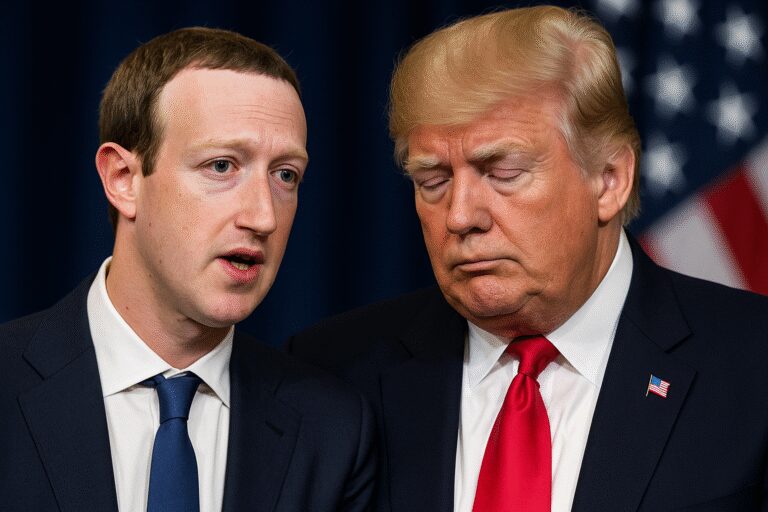A candid moment caught on a hot microphone has revealed Meta CEO Mark Zuckerberg expressing uncertainty about President-elect Donald Trump’s expectations for AI investments, providing a rare glimpse into the tech mogul’s private thoughts during what appears to be a high-stakes political conversation.
The Hot Mic Moment
According to multiple sources familiar with the recording, Zuckerberg can be heard discussing Trump’s AI investment expectations with what appears to be a Meta executive. The Facebook founder’s voice carries a note of confusion as he attempts to parse the president-elect’s specific requirements.
“I honestly wasn’t sure what he meant by AI investment,” Zuckerberg reportedly said during the captured conversation. “Does he want infrastructure spending? Research partnerships? Job commitments? The ask wasn’t entirely clear.”
The moment highlights the challenge tech executives face when navigating political expectations, particularly around emerging technologies where policy frameworks remain fluid and poorly defined.
Context Behind the Confusion
The awkward exchange comes amid a broader push by the Trump transition team to secure commitments from major technology companies regarding artificial intelligence development and investment in the United States. However, the specific nature of these requests appears to vary significantly depending on the company and context.
What Trump Has Said About AI Investment
Trump’s public statements about AI investment have covered several different areas:
| Investment Type | Trump’s Position | Industry Impact |
|---|---|---|
| Infrastructure | Wants data centers built on U.S. soil | Billions in construction spending |
| Research & Development | Supports American AI leadership | Increased R&D budgets |
| Job Creation | Emphasizes domestic employment | Hiring commitments from tech firms |
| National Security | AI development for defense purposes | Government contracts and partnerships |
Meta’s AI Investment Dilemma
For Zuckerberg, the uncertainty around Trump’s expectations creates a particularly complex situation. Meta has already committed substantial resources to AI development, but the company’s investments don’t always align neatly with traditional political talking points about domestic job creation or infrastructure spending.
Meta’s Current AI Initiatives
Meta’s artificial intelligence efforts span multiple areas that may or may not satisfy Trump’s investment criteria:
- Reality Labs: Billions invested in virtual and augmented reality technologies
- AI Research: Fundamental research into machine learning and neural networks
- Content Moderation: AI systems for managing platform safety and policy enforcement
- Advertising Technology: Sophisticated AI for targeted advertising and user engagement
The challenge for Zuckerberg lies in determining which of these existing investments might satisfy political expectations and where additional commitments might be needed.
The Broader Tech Industry Response
Zuckerberg’s confusion appears to reflect a wider uncertainty within Silicon Valley about the incoming administration’s technology priorities. Other major tech companies have reportedly received similar requests for AI investment commitments, but with varying levels of specificity.
Industry-Wide Challenges
Several factors contribute to the confusion among tech executives:
Vague Policy Framework: The Trump transition team has not released detailed AI policy documents, leaving companies to guess at specific requirements.
Multiple Stakeholders: Different advisors and cabinet nominees have expressed varying priorities for AI development and regulation.
Rapid Technology Evolution: AI capabilities and applications continue to evolve quickly, making long-term investment commitments challenging to structure.
Regulatory Uncertainty: Companies remain unsure about how future AI regulations might affect their investment strategies.
Political Implications
The hot mic moment raises questions about the effectiveness of the Trump transition team’s outreach to major technology companies. If industry leaders are unclear about specific expectations, it may indicate a need for more structured policy communication.
Potential Consequences
The revelation could have several political ramifications:
Policy Clarification Pressure: The incident may force the Trump team to provide more detailed AI investment guidelines to avoid further confusion.
Industry Relations: Tech companies may become more cautious about making commitments without clear policy frameworks in place.
Public Perception: The awkward exchange could be seen as evidence of poor communication between the incoming administration and Silicon Valley leaders.
What This Means for AI Development
Beyond the immediate political implications, Zuckerberg’s confusion highlights broader challenges in coordinating national AI strategy between government and private industry.
Investment Coordination Challenges
The incident underscores several systemic issues in AI policy development:
Lack of Standardized Metrics: There’s no agreed-upon way to measure or compare AI investments across different companies and applications.
Competing Priorities: Private companies focus on profitability and innovation, while government priorities emphasize national security and job creation.
Technical Complexity: AI development often involves highly technical considerations that don’t translate easily into political talking points.
Global Competition: Companies must balance domestic investment commitments with the need to compete internationally in AI development.
Moving Forward
The hot mic incident, while embarrassing for Zuckerberg personally, may ultimately serve a constructive purpose by highlighting the need for clearer communication between the incoming administration and the technology industry.
For the Trump administration, the moment suggests an opportunity to develop more specific and actionable AI policy frameworks that companies can understand and implement effectively.
For Meta and other tech companies, the incident underscores the importance of seeking clarity before making significant public commitments about AI investments or strategic directions.
For the broader AI industry, Zuckerberg’s confusion may reflect legitimate uncertainty about how best to structure AI investments to serve both commercial and national interests.
As the Trump administration prepares to take office, clearer guidance on AI investment expectations could help avoid similar moments of confusion and enable more productive collaboration between government and industry leaders. The stakes for American AI development are too high to leave such important conversations to guesswork and interpretation.
The hot mic moment may be awkward, but it could ultimately contribute to more effective AI policy development by forcing all parties to communicate more clearly about their expectations and capabilities in this critical area of national competitiveness.

